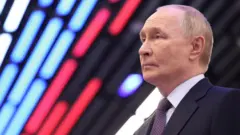Sometimes it's not what's said that makes the biggest impression. It's the reaction. In the Russian Far East, Vladimir Putin delivered a warning to the West: don't even think about sending soldiers - and that includes peacekeepers - to Ukraine. If some troops appear there, the Russian president said, especially now while the fighting's going on, we proceed from the premise that these will be legitimate targets for destruction. The audience at the economic forum in Vladivostok burst into applause, with Russian officials and business leaders apparently welcoming the threat to 'destroy' Western troops. This reaction was chilling, especially coming just a day after Kyiv's allies pledged a post-war 'reassurance force' for Ukraine.
The audience applauded again when the Kremlin leader suggested he would be prepared to meet Ukraine's President Volodymyr Zelensky - but only on home soil. The best place for this is the Russian capital, in Hero City Moscow, said Putin. Outside Russia, his proposal has been dismissed as unserious, a complete non-starter. But in many ways it encapsulates the Kremlin's current position on the war in Ukraine: Yes, we want peace, but only on our terms. You reject our terms? No peace then.
This uncompromising stance is fuelled by a combination of factors. First, there is the Kremlin's belief in the military initiative in Ukraine. Second, recent diplomatic successes, as Putin met with influential world leaders, project an image of Russia as having powerful friends like China, India, and North Korea. Lastly, U.S. President Donald Trump's overtures have been perceived in Russia as evidence that the West's attempts to isolate the country have failed.
As the fighting continues, the contrasting aims of Russia, Ukraine, and the West further complicate peace prospects. While Ukraine and Europe seek to end the conflict and enhance post-war security, Putin's vision appears focused on a Russian victory and a new global order that benefits Russia. The divergent paths of these parties raise significant questions about when and if negotiations may lead to resolution.
The audience applauded again when the Kremlin leader suggested he would be prepared to meet Ukraine's President Volodymyr Zelensky - but only on home soil. The best place for this is the Russian capital, in Hero City Moscow, said Putin. Outside Russia, his proposal has been dismissed as unserious, a complete non-starter. But in many ways it encapsulates the Kremlin's current position on the war in Ukraine: Yes, we want peace, but only on our terms. You reject our terms? No peace then.
This uncompromising stance is fuelled by a combination of factors. First, there is the Kremlin's belief in the military initiative in Ukraine. Second, recent diplomatic successes, as Putin met with influential world leaders, project an image of Russia as having powerful friends like China, India, and North Korea. Lastly, U.S. President Donald Trump's overtures have been perceived in Russia as evidence that the West's attempts to isolate the country have failed.
As the fighting continues, the contrasting aims of Russia, Ukraine, and the West further complicate peace prospects. While Ukraine and Europe seek to end the conflict and enhance post-war security, Putin's vision appears focused on a Russian victory and a new global order that benefits Russia. The divergent paths of these parties raise significant questions about when and if negotiations may lead to resolution.
















